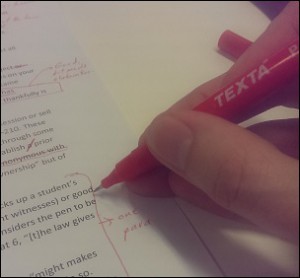The Ruling Tenth of the Law – Updated Commentary in TLA
You have likely heard the expression “possession is nine-tenths of the law”. But what does it actually mean? It does not (as its literal meaning implies) mean that the person who possesses an object holds a claim nine times stronger than one who does not possess it. Rather, it is the final tenth of the law, “relative good title” that trumps and dominates the other nine – though it is a lot easier to prove possession than good title!
In Asher v Whitlock (1865) LR 1 QB 1, Cockburn CJ stated (at 5) that “possession is good against all the world except the person who can shew a good title”.
This is an important distinction, as the law will presume that the person in possession of an object (or interest in land) has the legal right to possess it. You are presumed by the law to own the shoes on your feet, the shirt on your back and the vehicle you are driving. If somebody else claims that same thing as hers or his, the possessor is the presumed owner and must be proven otherwise. This has interesting implications when it comes to criminal matters such as “driving while black” (thankfully less of a problem in Australia than in other countries), a situation where the vehicle’s possessor is often presumed not to be the owner due to racial profiling by the arresting officer.
In land claims, possession gives rise to certain rights, including the right to defend possession or sell the interest in land: Mabo v Queensland (No 2) (1992) 175 CLR 1, Toohey J at 209–210. These rights extend to the “defendant in possession” even if that possession was acquired through some wrongdoing on the defendant’s part. To establish a better claim, a claimant must be able to establish prior possession of the land. Interestingly, the law is never concerned with questions of “ownership” but rather of “possession”.
[caption id="attachment_13698" align="alignright" width="300"] Where did I put that receipt?[/caption]
Where did I put that receipt?[/caption]
An example used by law professors Australia-wide is as follows. The professor picks up a student’s pen and says, “This is mine.” Without proof of the theft (eg testimony from 300 law-student witnesses) or good title (eg if the diligent student kept a receipt for that particular pen), the law considers the pen to be the property of whoever is holding it. As Mellor J stated in Asher v Whitlock at 6, “[t]he law gives credit to possession unless explained”. If possession were truly nine-tenths of the law, this behaviour would encourage a “might makes right” approach, where the one with the power to exclude others from possession may do so. And in a way (by putting the balance of proof strongly on the side of the possessor) the law does. At least until somebody with a stronger claim can prove otherwise.
Possession is discussed in The Laws of Australia Subtitle 28.16 “Possession” while native title is discussed in depth in Subtitle 1.3 “Land Law”.
For more information about The Laws of Australia, click here.
